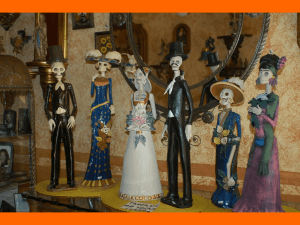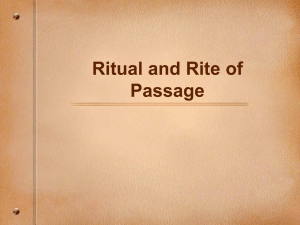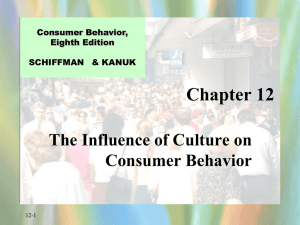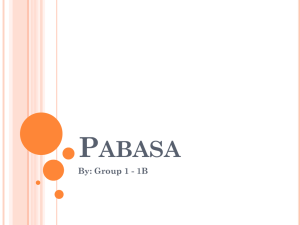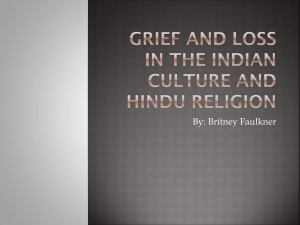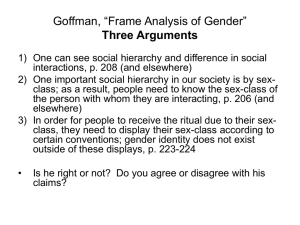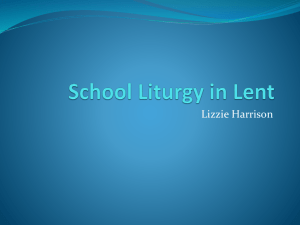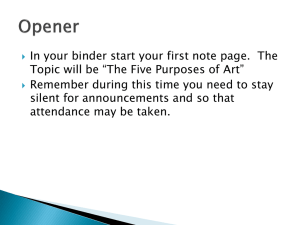TABOO
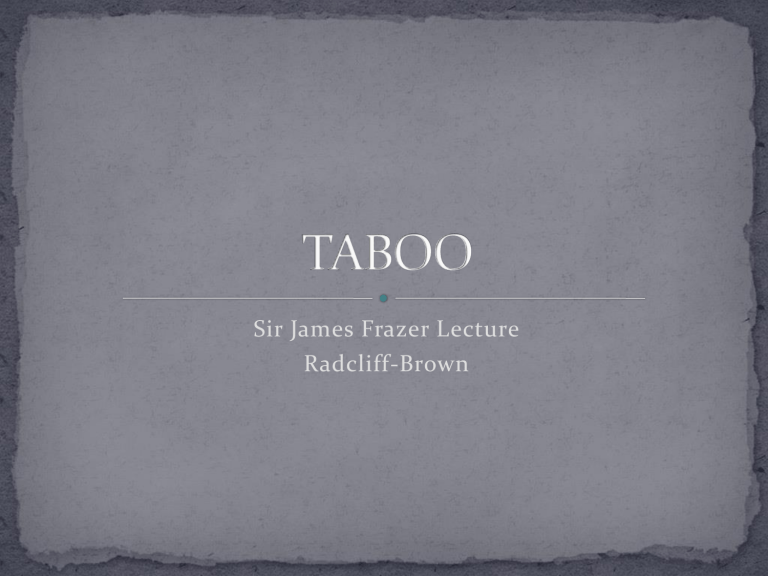
Sir James Frazer Lecture
Radcliff-Brown
Taboo- ‘tabu’- to forbid, forbidden, any kind of prohibition
Polynesian Tabu- newly-born infant, a corpse, and the chief are considered Tabu.
Individuals who are tabu must engage in precautions to prevent from becoming ill.
Noa- Status of a person after they are restored to their normal condition through rites of purification or desacralisation.
Originally, anthropologists believed that taboo was confined to the black and brown races of the Pacific
All cultures have some type of taboo
Ritual Prohibition- A rule of behavior which is associated with a belief that an infraction will result in an undesirable change in the ritual status of the person who fails to keep to the rule.
Taboo
Polynesian touches corpse
Result
Will be in danger of illness
Ritual
Undergoes ritual to escape danger and be restored to his former ritual status
Spilling Salt Bad luck
Catholics abstaining from eating meat on Fridays and during Lent
Sin- change in ritual status
Throw pinch of salt over shoulder
Confess and obtain absolution
Hebrew touches the unclean beast (aware or unaware)
Sin
Speak the name of soon to be parent
Bad Luck, Illness, Possibly
Death
Confess and offer sacrifice
Ritual must be done
Thahu- undesirable ritual status that results from failure to observe rules of ritual avoidance
A person who is thahu will be ill and will probably die unless he removes the thahu through ritual.
This includes animal sacrifice
Mentawai Ceremony http://www.youtube.com/watch?feature=player_det ailpage&v=kUXDvU87-M4
Religion- a propitiation of superhuman powers which are believed to control nature and man
The rite is simply expressive and has no purpose, being not a means to an end but an end in itself.
Eating meat on Friday
Magic- the erroneous application of the notion of causality
Definite practical purpose which is known to all who practise it and can be easily elicited from any native informant
Spilling Salt
This difference is not as discernible in many circumstances because there is a great deal of overlap between magic and religion.
Religious explanation- Any breach in commandments are punished by an atua (ghost) afflicting the sinner with a painful malady until death.
Magical explanation- The native conceives of the change in his ritual status as taking place as the immediate result from acts such as, touching a corpse.
They only consider the gods and spirits of being concerned, when talking of taboos as a whole.
Certain objects or individuals are avoided because they are holy, while others are avoided because they are unclean
Polynesians do not identify chiefs as holy or corpses as unclean. Both are considered dangerous.
It is important to avoid implementing our own ideas of holiness or uncleanliness onto simpler societies
Anything that is the object of a ritual avoidance or taboo has ritual value
The ritual value is exhibited in the behavior adopted towards the object
A society consists of a number of individuals bound together in a network of social relations.
The first necessary condition of the existence of a society is that the individual members shall agree in some measure in the values that they recognize.
A society is characterized by a set of values
Simple Society- There is a fair amount of agreement amongst group members, but the agreement is never absolute
Complex Society- There is much more disagreement if we consider the society as a whole, but there is a closer measure of agreement among members of groups or classes within the society.
When two or more persons share a common interest, they form an association, whether for a moment or for a long period.
Subject 1 and Subject 2 are both interested in the same way in the Object, and both Subjects are interested in each other in some way.
The Object has social value for both Subjects involved.
In some groups, each member is an object of interest for all others, and each member has social value for the group as a whole.
Groups can be formed by common interest or common enemy.
Ritual- n- an established or prescribed procedure for a religious reason or other rite.
Ritual values exist in every known society, and show an immense diversity.
Sports rituals
Catholic Sacrament
Maori Haka dance
This answer is difficult to find
What is fundamentally the same rite in two different societies may have different purposes or reasons in each society.
Members of the community may be unsure of the reason for the ritual, or they may give varying explanations.
People always know the meaning of their own symbols, but they do so intuitively and can rarely express their understanding in words
Study rites by studying the effects the rites produce, not the effects they are supposed to produce.
A rite has immediate psychological effects on the people participating.
It also effects the social structure of the community.
The immediate psychological effects can be observed by watching and talking to the performers of the ritual.
Many rites produce individual satisfaction for the performers.
Amazon suicide ritual www.youtube.com/watch?v=ak5GichjaCM&feature=player_detailpage#t=110s
During Childbirth rituals, Death rituals,
Coming of Age rituals, and Wedding rituals.
Avoid names of individuals involved
Avoid certain foods
The personal name is a symbol of social personality
Avoiding the name symbolizes a change in social personality
They avoid certain foods because they believe they will be ill otherwise.
Andamanese in all of these different life states are in abnormal ritual status.
Theory 1:
In certain circumstances an individual is anxious about the outcome of some event or activity because it depends on conditions out of their control
People observe some rite or ritual to reassure them because the ritual is thought to bring them good luck.
http://www.youtube.com/watch?feature=player_detailpage&list=UU3zJwLLuprpxqCu9MHzuuA&v=wPCwy-bXc0g#t=65s
Theory 2:
If it were not for the existence of the rite and the beliefs associated with it, the individuals would feel no anxiety, and that the psychological effect of the rite is to create a sense of insecurity and danger.
People are conditioned by the community in which they live.
The sharing of hopes and fears links human beings together in temporary or permanent associations.
The simplest form of ritual sanction is an accepted belief that if rules of ritual are not observed some undefined misfortune is likely to occur.
A new father is naturally anxious at the outcome of childbirth because he has no control
Childbirth is dangerous, especially in tribal cultures
He observes taboo and participates in rituals to feel as if he has some type of control.
He avoids certain foods to improve his luck.
He eases his own anxiety through rituals.
The primary basis of all ritual is the attribution of ritual value to objects and occasions which are either themselves objects of important common interests linking together the persons of a community .
Negative and positive rites exist and persist because they are part of the mechanism by which an orderly society maintains itself in existence, serving as they do to establish fundamental social values.
Taboo is used to apply social value to certain actions, events, and concepts.
Taboo symbolizes what the society values
Taboo
Consuming the flesh of the dead
Rituals
Equated eating the flesh to Holy Communion
Nightly Rosary
Used their prayer ritual to calm their fears and renew hope http://www.youtube.com/watch?feature=player_detailpage&v=LYmE0_ZvbrQ#t=421s
